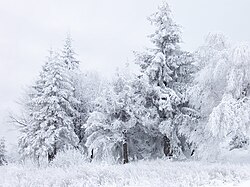눈
| ||||||||||
| 누눅눆눇눈눉눊 눋눌눍눎눏눐눑 눒눓눔눕눖눗눘 눙눚눛눜눝눞눟 | |
| 뇨 ← | → 눠 |
|---|---|
Korean
[edit]|
Click on labels in the image. |
Etymology 1
[edit]First attested in the Jīlín lèishì (鷄林類事 / 계림유사), 1103, as Late Old Korean 嫩.
In the hangul script, first attested in the Seokbo sangjeol (釋譜詳節 / 석보상절), 1447, as Middle Korean 눈〮 (Yale: nwún).
Pronunciation
[edit]- (SK Standard/Seoul) IPA(key): [nun]
Audio: (file)
- Phonetic hangul: [눈]
| Romanizations | |
|---|---|
| Revised Romanization? | nun |
| Revised Romanization (translit.)? | nun |
| McCune–Reischauer? | nun |
| Yale Romanization? | nwun |
- South Gyeongsang (Busan) pitch accent: 눈의 / 눈에 / 눈까지
Syllables in red take high pitch. This word always takes high pitch and also heightens the next suffixed syllable, unless it is 에.
Noun
[edit]
눈 • (nun)
- eye (organ allowing animals to see)
- appreciative eye (for), discerning eye (for)
- vision (the ability to see), eyesight
- eyes, gaze; attention
- point of view, viewpoint
Derived terms
[edit]- 겉눈 (geonnun)
- 곁눈 (gyeonnun)
- 까막눈 (kkamangnun)
- 눈가 (nun'ga)
- 눈가리개 (nun'garigae)
- 눈곱 (nun'gop)
- 눈길 (nun'gil)
- 눈깔 (nunkkal)
- 눈꺼풀 (nunkkeopul)
- 눈높이 (nunnopi)
- 눈대중 (nundaejung)
- 눈도장 (—圖章, nundojang)
- 눈독 (—毒, nundok)
- 눈동자 (—瞳子, nundongja)
- 눈망울 (nunmang'ul)
- 눈매 (nunmae)
- 눈물 (nunmul)
- 눈방울 (nunbang'ul)
- 눈빛 (nunbit)
- 눈살 (nunsal)
- 눈속임 (nunsogim)
- 눈시울 (nunsiul)
- 눈싸움 (nunssaum)
- 눈썰미 (nunsseolmi)
- 눈썹 (nunsseop)
- 눈알 (nunal)
- 눈약 (—藥, nunyak)
- 눈주름 (nunjureum)
- 눈짓 (nunjit)
- 눈초리 (nunchori)
- 눈총 (nunchong)
- 눈치 (nunchi)
- 뜬눈 (tteunnun)
- 맨눈 (maennun)
- 속눈 (songnun)
- 실눈 (sillun)
- 애꾸눈 (aekkunun)
- 외눈 (oenun)
- 짝눈 (jjangnun)
- 첫눈 (cheonnun)
See also
[edit]Etymology 2
[edit]First attested in the Jīlín lèishì (鷄林類事 / 계림유사), 1103, as Late Old Korean 嫩.
In the hangul script, first attested in the Yongbi eocheon'ga (龍飛御天歌 / 용비어천가), 1447, as Middle Korean 눈〯 (Yale: nwǔn).
Pronunciation
[edit]- (SK Standard/Seoul) IPA(key): [nu(ː)n]
Audio: (file)
- Phonetic hangul: [눈(ː)]
- Though still prescribed in Standard Korean, most speakers in both Koreas no longer distinguish vowel length.
| Romanizations | |
|---|---|
| Revised Romanization? | nun |
| Revised Romanization (translit.)? | nun |
| McCune–Reischauer? | nun |
| Yale Romanization? | nwūn |
- South Gyeongsang (Busan) pitch accent: 눈의 / 눈에 / 눈까지
Syllables in red take high pitch. This word always takes low pitch, and heightens the pitch of two subsequent suffixed syllables.
Noun
[edit]
눈 • (nun)
Derived terms
[edit]See also
[edit]Etymology 3
[edit]First attested in the Beonyeok nogeoldae (飜譯老乞大 / 번역노걸대), 1517, as Middle Korean 눈〮 (Yale: nwún).
Pronunciation
[edit]- (SK Standard/Seoul) IPA(key): [nun]
Audio: (file)
- Phonetic hangul: [눈]
| Romanizations | |
|---|---|
| Revised Romanization? | nun |
| Revised Romanization (translit.)? | nun |
| McCune–Reischauer? | nun |
| Yale Romanization? | nwun |
Noun
[edit]눈 • (nun)
- (less common) scale, graduation (on a measuring device)
- Synonym: (more common) 눈금 (nun'geum)
Derived terms
[edit]- 눈금 (nun'geum)
Etymology 4
[edit]Of native Korean origin.
Pronunciation
[edit]- (SK Standard/Seoul) IPA(key): [nun]
Audio: (file)
- Phonetic hangul: [눈]
| Romanizations | |
|---|---|
| Revised Romanization? | nun |
| Revised Romanization (translit.)? | nun |
| McCune–Reischauer? | nun |
| Yale Romanization? | nwun |
Noun
[edit]눈 • (nun)
Derived terms
[edit]Etymology 5
[edit]Korean reading of various Chinese characters.
Syllable
[edit]눈 • (nun)
Middle Korean
[edit]Etymology 1
[edit]Pronunciation
[edit]Noun
[edit]눈〮 (nwún) (locative 누네〮 (nwùn-éy))
Descendants
[edit]- Korean: 눈 (nun)
Etymology 2
[edit]Pronunciation
[edit]Noun
[edit]눈〯 (nwǔn) (locative 누〯네〮 (nwǔn-éy))
Descendants
[edit]- Korean: 눈 (nun)
- Character boxes with compositions
- Hangul Syllables block
- Hangul script characters
- Visual dictionary
- Korean terms inherited from Late Old Korean
- Korean terms derived from Late Old Korean
- Native Korean words
- Korean terms inherited from Middle Korean
- Korean terms derived from Middle Korean
- Korean terms with audio pronunciation
- Korean terms with IPA pronunciation
- Korean terms with dialectal pitch accent marked
- Korean lemmas
- Korean nouns
- Korean terms with usage examples
- Korean terms with long vowels in the first syllable
- Korean syllables
- Hanja readings
- Sino-Korean words
- Korean pitch accent minimal pairs
- ko:Anatomy
- ko:Snow
- ko:Weather
- Middle Korean terms with IPA pronunciation
- Middle Korean lemmas
- Middle Korean nouns

